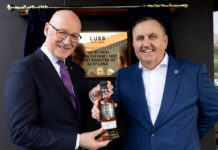An informed team can help sell more whisky in the weeks ahead

THE move to darker spirits coinciding with darker nights is already underway in the on-trade as the end of the year approaches and consumers look for a warming spirit or two to combat the Scottish winter.
Naturally, operators intent on finishing the year with a flourish will be keen on maximising the opportunity the festive season provides to sell more of Scotland’s national drink in their outlets.
And experts from Scotland’s whisky industry have told SLTN they believe the secret to improving sales in venues up and down the country, into the winter months and beyond, is to improve staff knowledge of each of the whiskies they stock.
“Whisky is a spirit commonly associated with the wintery weather and cold nights,” said Euan Mitchell, managing director of Isle of Arran Distillers.
“A warming dram as the days grow shorter is a very attractive prospect to customers, meaning the category naturally performs well at this time of year.”
There have been noticeable attempts to try and capture a new generation of whisky drinkers through clever marketing strategies.
But Mitchell believes that, as consumers become more interested in the provenance of their drinks, it’s bar staff that are the most effective tool for attracting new customers to the category – as well as up-selling to existing ones.
Increased public interest in provenance has led to a demand for whiskies with a sense of history.
He said: “Increased public interest in provenance has led to a demand for whiskies with a sense of history. This is perhaps even more relevant to younger customers who are shying away from more recognisable brands in favour of something more unique.
“It is hugely beneficial to have bar staff with enough knowledge to guide customers who show an interest in the category.
“Staff should be able to guide people towards drams that they might enjoy and know [the]background to each dram and distillery behind the bar.”
Staff should be able to guide people towards drams that they might enjoy.
Arming staff with greater awareness of the whiskies on the bar was also endorsed by others in the industry.
Highland whisky distiller Tomatin’s marketing manager, Jennifer Masson, said: “If staff are empowered with knowledge, this will shine through and instil confidence in the customer.
“Take staff trips to the distilleries. We are more than willing to host on-trade staff intent on learning more about the brand.”
And Katy Macanna, UK brand manager for Glengoyne at Ian Macleod Distillers, said knowledgeable staff are “the most vital technique” for making the most of whisky.
She added that, ideally, bartenders should be “knowledgeable and passionate about the whisky they are selling and able to provide the customer with the full profile of the whisky, helping customers comprehend and appreciate what they are buying into”.
“Knowing the history of the whisky and brand story can often add personality to the malt, helping establish a more emotional connection between the customer and the product,” said Macanna.

Getting the range right
A good selection alongside whisky menus can shine in bars
When it comes to which whiskies to stock, licensees need to be thoughtful about what’s on their shelves; too many similar styles or not enough information for customers can be detrimental to sales.
Therefore, a well-planned range that covers the key flavour bases is recommended.
“A good range of whiskies should include different flavour profiles,” said Macanna at Ian Macleod Distillers.
“Whisky can be mystifying but consumers understand flavour, so categorising whiskies by flavour should attract new consumers.”
As on-trade customers are known to be looking for a treat as they round off the year, the festive period can also provide the chance to sell higher-end whiskies, say firms.
Ryan Tucker, spirits category marketing manager at wholesaler Matthew Clark, said: “We know outlets that stock between five and eight malt whiskies have been proven to sell more and that seven out of ten spirits drinkers would look for a premium brand.
Offer a comprehensive range and create a price ladder giving you the opportunity to up-sell.
“So, offer a comprehensive range and create a price ladder giving you the opportunity to up-sell.”
A general trend towards more premium whiskies was reinforced by the William Grant & Sons UK Market Report 2017, which noted a 6.8% growth in single malt sales and stated that growth was “being driven primarily by the premium end of the market”.
Whisky menus have also been held up as a way for licensees to simplify and explain their ranges better – with straightforward explanations of a venue’s whiskies helping consumers make an informed decision.
“A whisky menu is a great tool for operators, as it allows them the opportunity to lay their whiskies out by style/flavour profile,” said Tucker of Matthew Clark.
“This really helps to encourage consumer trial, who may be encouraged to try a slightly different brand, safe in the knowledge that it won’t be a million miles away from their usual favourite.”
Loch Lomond Group’s marketing manager, Scott Dickson, believes whisky flights can also be useful in helping staff sell premium whisky.
He said flights which include three or more premium whiskies can be a great way to include a selection of older and younger single malts and “if presented as a way of sharing an experience, can really help drive sales”.
[box style=”4″]
Wholesaler’s serving suggestions
[half]
Classic Scotch Sour
- 75ml blended Scotch whisky
- 20ml lemon juice
- 20ml sugar syrup
- Lemon peel
Method: pour the ingredients into a cocktail shaker filled with ice. Shake well. Strain into an Old Fashioned glass filled with fresh ice. Garnish with a twist of lemon.
[/half][half_last]
Lazy Old Fashioned
- 60ml Monkey Shoulder
- 8ml sugar syrup
- 2 dashes of Angostura Bitters
- Orange peel
Method: add all ingredients to a mixing glass. Add cold dry ice and stir. Once dilution is reached strain into glass. Garnish with an orange peel over the glass.
[/half_last][half]
Morning Glory Fizz
- 50ml blended Scotch whisky
- 20ml sugar syrup
- 20ml egg white
- 15ml lemon juice
- Dash of absinthe
Method: pour ingredients into a cocktail shaker filled with ice. Shake well. Strain into a highball glass with cubed ice. Top with soda water.
[/half][half_last]
De Riguer
- 50ml blended Scotch whisky
- 20ml honey syrup
- 20ml grapefruit juice
Method: pour ingredients into a cocktail shaker filled with ice. Shake well. Serve in a cocktail glass.
– Provided by Matthew Clark
[/half_last]
[/box]























